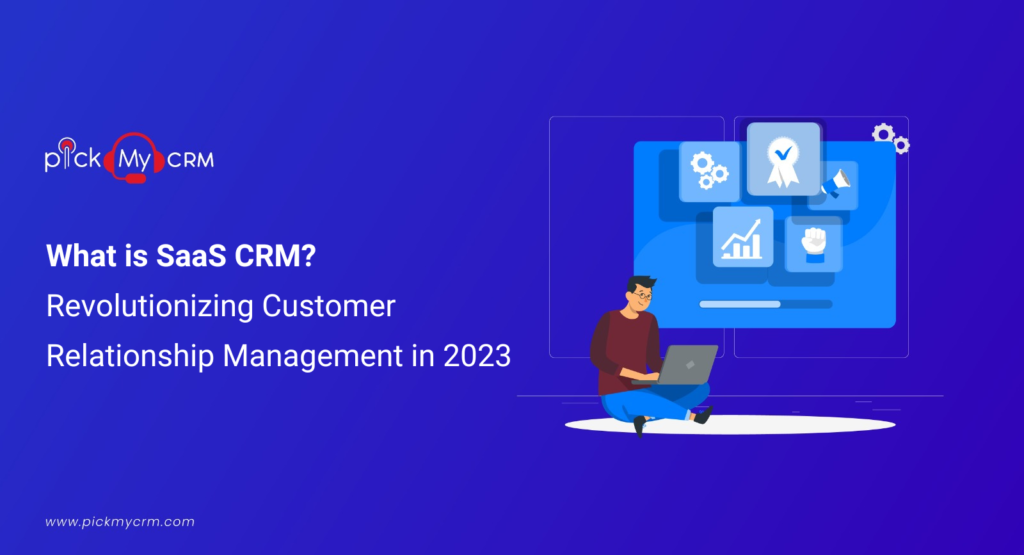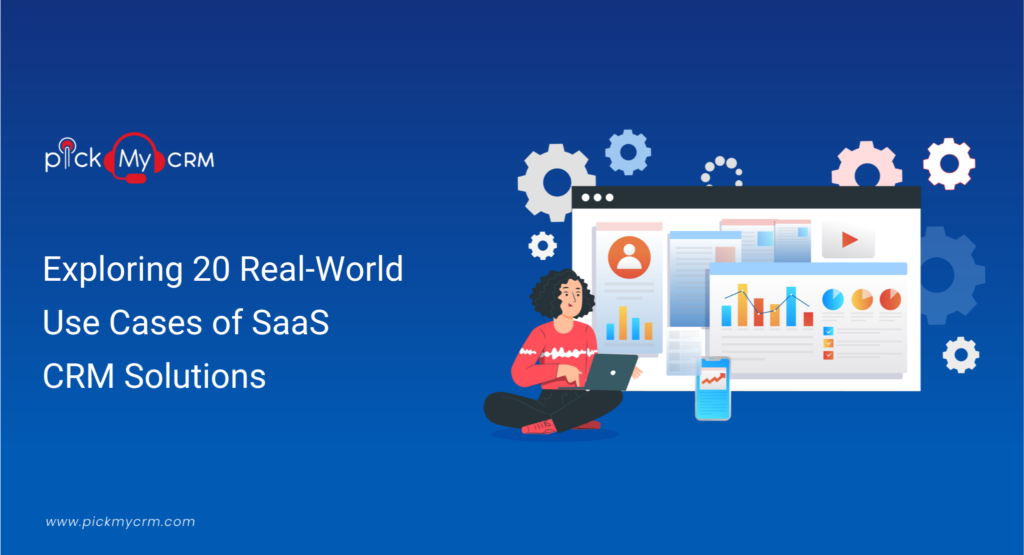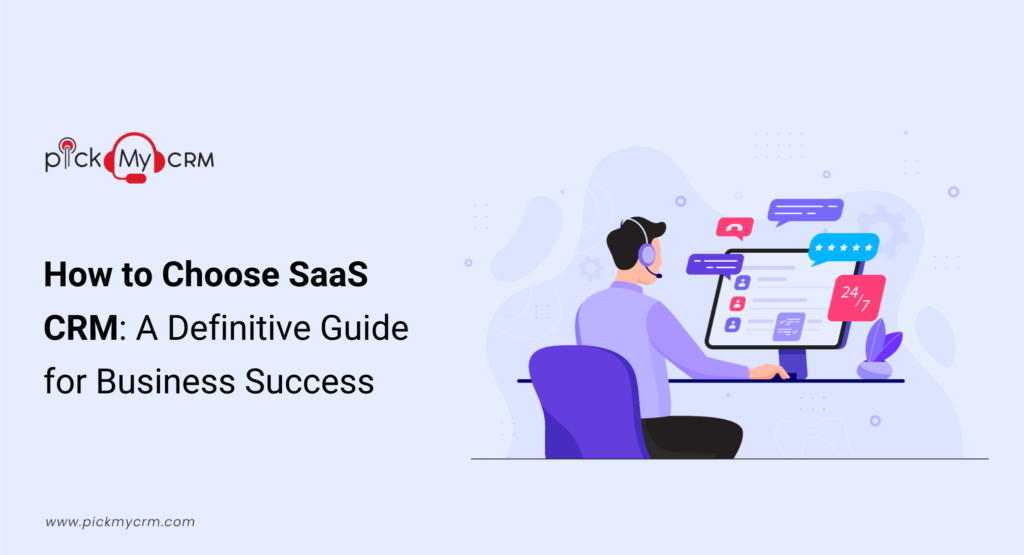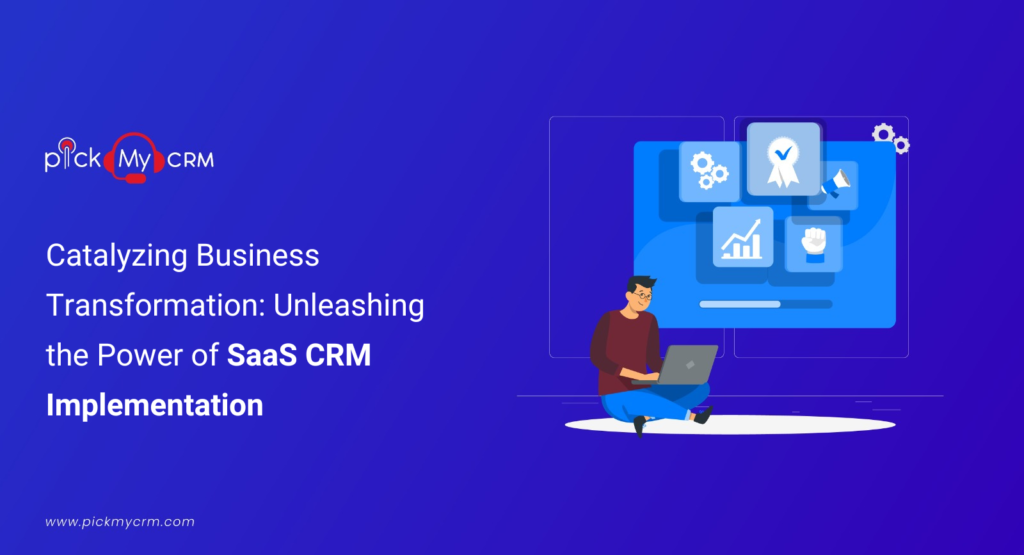What is SaaS CRM? Revolutionizing Customer Relationship Management in 2023
What is SaaS CRM?
SaaS CRM, or Software as a Service Customer Relationship Management, is a cloud-based Software solution designed to help businesses manage and nurture their customer relationships efficiently. Unlike traditional on-premises CRM systems, SaaS CRM is hosted on cloud servers, allowing users to access it from anywhere with an internet connection.How does SaaS CRM work?
SaaS CRM, or Software-as-a-Service Customer Relationship Management, is a cloud-based solution designed to streamline and enhance Customer interactions for businesses. Here's how it works,Cloud-Based Accessibility
SaaS CRM operates in the cloud, which means It's hosted on remote servers and accessed via the Internet. This cloud-based nature ensures that users can access the CRM system from anywhere with an internet connection. Whether you're in the office, at home, or on the move, Team members have real-time access to customer data and tools.Centralized Customer Data
SaaS CRM centralizes customer information. It stores data like contact details, purchase history, communication logs, and preferences in a single, unified database. This centralization eradicates data silos, guaranteeing that all members of the Organization can readily access the latest information.Lead and Sales Management
SaaS CRM helps businesses manage leads and sales processes more efficiently. It provides tools for tracking and nurturing leads, automating sales tasks, and monitoring the sales pipeline. Sales teams can prioritize leads, set reminders, and track progress through the sales funnel.Personalization
One of the key benefits of SaaS CRM is its ability to personalize customer interactions. Personalization enhances customer experiences by tailoring content and services to individual preferences, fostering deeper engagement and satisfaction. It allows businesses to forge more meaningful connections and drive brand loyalty.Data Security
Data security is a top priority for SaaS CRM providers. They invest in robust security measures to protect customer data from breaches and unauthorized access. Encryption, authentication, and regular security updates are standard practices to ensure data remains safe.Integration Capabilities
SaaS CRM systems often offer integration with other software applications. It means they can seamlessly connect with tools like marketing automation platforms, e-commerce systems, and analytics software. Integration streamlines workflows improves efficiency, and provides a more holistic view of customer interactions.AI-Powered Insights
Many SaaS CRM platforms incorporate artificial intelligence and machine learning to provide valuable insights. These insights can help businesses make data-driven decisions, identify trends, and forecast future customer behavior. SaaS CRM works with Cloud technology to Centralize customer data, improve accessibility, and enhance customer interactions. It empowers businesses to manage leads and sales, personalize customer experiences, maintain data security, integrate with other tools, and gain valuable insights from customer data, ultimately driving growth and customer satisfaction.When to consider implementing SaaS CRM?
Timing is essential when considering the Implementation of a SaaS CRM system, as it can unlock Benefits for businesses. Here are some key indicators to help you determine when to consider implementing SaaS CRM,- Business Growth: Consider implementing SaaS CRM when your business is experiencing rapid growth or planning to expand.
- Data Disarray: When customer data is dispersed and challenging to oversee, the necessity for a centralized CRM system becomes apparent.
- Customer Engagement: Poor customer engagement may indicate a need for personalized interactions, achievable with a CRM.
- Sales Efficiency: A CRM system can enhance and optimize inefficient sales processes.
- Data Security: A CRM system can address data security concerns and protect customer information.
- Integration Needs: Require seamless integration between various software tools, and SaaS CRM can serve as a hub.
- Data-Driven Decisions: Consider CRM for data-driven insights into customer behavior and preferences.
- Remote Work: In a remote work environment, SaaS CRM ensures accessibility from anywhere.
- Competitive Edge: Staying competitive in your industry may necessitate adopting CRM technology.
- Cost Efficiency: CRM can lead to cost savings through automation and improved efficiency.
- Customer Growth Goals: Adopt CRM for enhanced customer understanding and to nurture retention and growth.
Who Needs SaaS CRM?
SaaS CRM is essential for a Wide range of Individuals and organizations, regardless of size. Whether you're a large corporation, a small or medium-sized enterprise, or a solo entrepreneur, if you aim to,- Effectively manage all your contacts, including leads, prospects, and customers.
- Establish and manage sales pipelines.
- Monitor leads and streamline processes.
- Ensure your team is aligned and well-informed.
- Receive real-time updates on your deals.
- Cultivate and nurture relationships with potential and existing customers.
Top 5 SaaS CRM in 2023
Teamgate
Overview: Teamgate is an affordable and highly configurable CRM Designed for SaaS companies. It helps improve conversions, retain paying customers, and offers real-time sales data tracking. Features and Benefits- Centralized customer and lead data
- Sales pipeline management
- Contact management
- Lead capturing
- Extensive analytics and reporting
- Native call management (SmartDialer)
- Integrations with Mailchimp, Slack, Xero, LinkedIn, and more
Close
Overview: Close CRM is Customized for SaaS sales teams of small to medium size that depend on outreach and direct interactions. It offers a built-in caller app, predictive dialer, and SMS campaign tracking. Features and Benefits- Power Dialer
- Integrations with Zapier, Zoom, and more
- Email marketing features
- Custom opportunity pipelines
Microsoft Dynamics 365
Overview: Microsoft Dynamics 365 is a comprehensive suite of tools that includes sales, customer data, project management, and marketing features. It's well-suited for businesses integrated into the Microsoft 365 ecosystem. Features and Benefits- Natively embedded Power BI and Cortana intelligence
- Customizable reports and dashboards
- Automation capabilities
- Web browser functionality and apps for Windows, iOS, and Android
HubSpot CRM
Overview: HubSpot CRM is a popular choice known for its extensive integrations and feature set. It offers a free CRM version and various hubs, including Marketing Hub and Sales Hub. It provides tracking tools, email templates, and native sales pipeline management. Features and Benefits- Click-to-call
- Rich analytics
- Robust segmentation tools
- Email tracking and notifications
Zoho CRM
Overview: Zoho CRM is an affordable and scalable option for small SaaS companies. It includes essential features like analytics, workflow management, and sales pipeline tracking. Features and Benefits- AI-powered chatbot
- Predictive sales
- Secure digital signatures with Zoho Sign
- Omnichannel support
What distinguishes in-house CRM from SaaS CRM?
The choice hinges on three factors: accessibility across devices, resource investment (infrastructure, technical and administrative staff, risk management), and customization. In-house CRM offers greater customization but comes with higher costs and limited accessibility. SMBs in Search of a budget-friendly, hassle-free, and effective CRM solution should consider a cloud-based CRM, which provides effortless lead and sales management.Why choose SaaS CRM?
There are several compelling reasons to choose a SaaS (Software as a Service) CRM (Customer Relationship Management) system for your business, Accessibility: SaaS CRM systems are cloud-based, which means you can access your CRM data and tools from anywhere with an internet connection. This accessibility is crucial for remote teams, salespeople on the go, and businesses with multiple locations. Cost-Effective: SaaS CRM typically involves a subscription-based pricing model, which can be more cost-effective than investing in on-premises CRM software. Updates and Maintenance: SaaS CRM providers manage updates and maintenance, guaranteeing access to the latest features and security patches without self-management. Integration: Many SaaS CRM systems offer integrations with other business tools and applications, such as email, marketing automation, and analytics software. It streamlines your workflow and data management. Security: Reputable SaaS CRM providers invest in robust security measures to protect your data, often more effectively than smaller businesses can on their own. User-Friendly: SaaS CRM solutions are Designed to be user-friendly and easy to implement, reducing the learning curve for your team. Data Backup and Recovery: SaaS CRM providers provide routine data backups and disaster recovery strategies to safeguard your data's security and integrity. Customer Support: SaaS CRM vendors typically provide customer support, including training and troubleshooting assistance, to help you make the most of your CRM system.History of SaaS
Software as a Service (SaaS) has a rich history that spans several decades.The Early 1990s: The Emergence of ASPs
- Application Service Providers (ASPs) offered a precursor to SaaS by hosting and managing software applications for clients.
- These early ASPs provided remote access to applications over a network but often required dedicated connections.
The Late 1990s: The Rise of SaaS
- The software industry coined the term Software as a Service (SaaS).
- Companies like Salesforce (founded in 1999) introduced web-based CRM software, pioneering the modern SaaS model.
- SaaS gained traction as an alternative to traditional on-premises software, offering greater flexibility and scalability.
The Early 2000s: Advancements in Internet Connectivity
- The Expansion of the Internet and enhancements in connectivity rendered SaaS a more feasible option for businesses.
- Broadband internet allowed for faster and more reliable access to web-based applications, reducing the limitations of early ASP models.
The Mid-2000s: Expansion of SaaS Offerings
- SaaS offerings expanded beyond CRM to include a wide range of Business applications, such as project management, HR management, and collaboration tools.
- Companies like Google introduced web-based productivity suites with Gmail, Google Docs, and Google Drive.
The Late 2000s: Cloud Computing and Infrastructure
- The rise of cloud computing played a significant role in the growth of SaaS.
- Cloud infrastructure providers, like Amazon Web Services (AWS) and Microsoft Azure, offered scalable and reliable platforms for hosting and delivering SaaS applications.
The 2010s: Mainstream Adoption and Market Growth
- SaaS became increasingly mainstream, with businesses of all sizes adopting cloud-based software solutions.
- The SaaS market experienced rapid growth, with vendors providing Diverse applications spanning various industries.
- Mobile apps and improved mobile connectivity further facilitated SaaS adoption, allowing users to access software on the go.
Present and Future: Continued Expansion and Innovation
- SaaS continues to dominate the software market, with an ever-expanding ecosystem of applications and providers.
- Advancements in technology, such as artificial intelligence (AI) and machine learning (ML), are being integrated into SaaS applications, enhancing capabilities and user experiences.
- SaaS models are evolving, with hybrid approaches, microservices architecture, and industry-specific solutions gaining prominence.
The future of SaaS
Here is a summarisation of the future of SaaS,- Statistic: The SaaS market size is projected to reach $200+ billion by 2025.
- SaaS Integration Platforms (SIPs) for seamless integration between SaaS applications.
- Adoption of various cloud computing models like IaaS and PaaS.
- "Everything as a Service" (XaaS) involves the bundling of multiple "aaS" tools together.
- Flexible payment models based on usage, reducing upfront costs.
- Long-term relationships and collaboration with SaaS providers driving innovation.
- Data-driven insights and predictive analytics for better decision-making.
- They are outsourcing to cloud-based providers for scalability and reliable infrastructure.
- Continued evolution of SaaS offerings to cater to diverse business needs.
Types of SaaS CRM
Here are some common types of SaaS CRM systems,- Sales CRM
- Marketing CRM
- Customer Service/Support CRM
- E-commerce CRM
- Analytics CRM
- Social CRM
- All-in-One CRM




